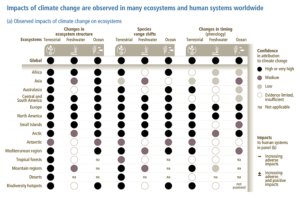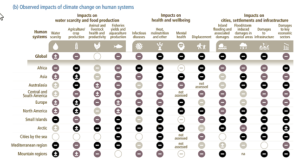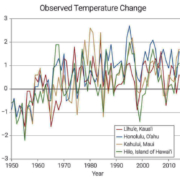New U.N. Climate Report; time’s up
Five things you should know about the U.N. climate report released today
The U.N. Intergovernmental Panel on Climate Change today released a sweeping report on the dangerous effects that rising global temperatures are already having — and the catastrophes that loom if humanity fails to make swift and significant cuts to planet-warming emissions.
Before spending hours poring over the more than a 3,500-page document full of devastating details, in the following you’ll discover five key take-away points and summary findings worth your time, and understanding.
1. Some climate effects are already baked in
Fish are dying in oceans that have heated up and become more acidic. Climate disasters such as supercharged wildfires, hurricanes and floods have claimed lives and ravaged communities.
2. It’s not too late to prevent some of the potential suffering
Despite these irreversible effects, the report emphasizes that humanity still has time to act to stave off more suffering in the future.
Scientists estimate that for every dollar spent on resilience and adaptation, countries could save at least $4 over time.
3. Warming is widening inequities between rich and poor nations
Many developing countries have released little carbon dioxide into the atmosphere, yet they are most vulnerable to the effects of the climate crisis. The report makes clear that these inequities will persist as the world warms.
So far, wealthy countries have failed to fulfill their promise to provide $100 billion annually to help poor nations green their economies and adapt to climate effects. Developed nations will probably face intense pressure to deliver on this pledge at the next U.N. climate summit in Egypt in November.
4. The climate crisis is intertwined with the biodiversity crisis
Global warming is already threatening plants and animals by shifting seasonal weather patterns and intensifying habitat-destroying disasters. If global temperatures rise by 2 degrees Celsius (3.6 degrees Fahrenheit), 10 percent of all plant and animal species could face a high risk of extinction, the report says.
At 3.2 Celsius (5.8 Fahrenheit), a quarter of all salamanders could go extinct. By 4 Celsius (7.2 Fahrenheit), half of the Amazon rainforest could be lost.
5. The time to act is now
For all of the sobering statistics in the report, its overarching message is not one of hopelessness, but of urgency to act, our colleagues Brady and Sarah write.
Humanity still has a limited window to overhaul the way energy is generated, the way cities are designed and the way food is grown — changes that ultimately could save trillions of dollars and millions of lives.
“These are projections, they are not predictions,” Patrick Gonzalez, a lead author of the report and a climate scientist at the University of California at Berkeley, told our colleagues of the findings. “It’s all based on humans and our actions. The future is something we can change.”
IPCC Climate Report – Summary findings:
Even as isolated Hawaii as may be, the state cannot escape the climate change impacts reported in the IPCC report now underway.
- Climate change has caused substantial damages, and increasingly irreversible losses, in terrestrial, freshwater and coastal and open ocean marine ecosystems (vetted report conclusion: high confidence).
- The extent and magnitude of climate change impacts are larger than estimated in previous assessments (vetted report conclusion: high confidence).
- Widespread deterioration of ecosystem structure and function, resilience and natural adaptive capacity, as well as shifts in seasonal timing have occurred due to climate change (vetted report conclusion: high confidence),
- …with adverse socioeconomic consequences (vetted report conclusion: high confidence).
- Approximately half of the species assessed globally have shifted polewards or, on land, also to higher elevations (vetted report conclusion: very high confidence).
- Hundreds of local losses of species have been driven by increases in the magnitude of heat extremes (vetted report conclusion: high confidence),
- …as well as mass mortality events on land and in the ocean (vetted report conclusion: very high confidence) and
- loss of kelp forests (vetted report conclusion: high confidence).






“The future is something we can change.”
Yep! It would still seem to be in our own hands BUT human nature is not something we can change in time.
Let’s check ‘Greta’s’ watch…2030?…its less than 7 years and 9 months away now.
Yep!…the time and tides wait for no man, especially not for 8 billion of us.
Ready to hitch a ride on one of Elon’s rockets to Mars?